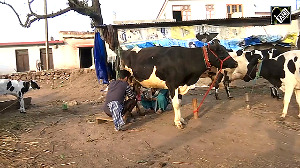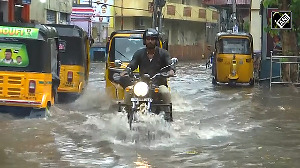
Ronny Jhutti is giving one of the most riveting performances in New York in the play The People Next Door. He plays Nigel, the son of a white woman and a Pakistani in Glasgow, who is drawn to the Jamaican lifestyle and its lilting speech. He is not interested in what happens to the Muslim immigrant community. Nigel lives in a drug-induced life.
His life changes after 9/11 when a bully police officer forces him to spy on a local mosque so that Nigel can find out where his half brother, a suspected terrorist, is hiding.
Jhutti, whose television and film credits include the 1992 film Immaculate Conception (starring Shabana Azmi) and EastEnders, is a volcano of talent who is yet to achieve full recognition for his hard work.
The People Next Door started as a small play in Edinburgh, transferred to London where The Guardian called it 'blissfully and absurdly entertaining,' and has been performed in half a dozen countries in Europe, including Germany and Bosnia.
Jhutti, 31, also plays a dholak player in Don't Stop Dreaming, an English film made in London by director Karan Saluja and featuring Rishi Kapoor. He spoke to Senior Editor Arthur J Pais in New York.
You have an unusual last name. Where does it come from?
It is an unusual Punjabi name.
Sikh to be precise. I was born in London and was raised by a Sikh father and Hindu mother
Is Ronny your given name?
It is Ajay. But my mother called me Ronny since I was very young.
Does anyone call you by your given name?
No, except for someone like the taxman.
When did you decide to become an actor?
In high school. Though I was not fond of most plays I had to read, especially Shakespeare's. Shakespeare was like a math equation, four into two equals eight.
One learned Shakespeare like a formula. I read Arthur Miller's A View From the Bridge. Suddenly I related to it and started thinking of the power of theatre.
What drew you most to the Miller play?
It is about Italian-American immigrants looking for a new life in New York City. I could relate it to my self as someone from a different background trying to come to terms with the mainstream.
Inspired by A View From the Bridge, I began to take acting classes. I initially wanted to try acting as a hobby. But soon I thought of taking it up as a profession.
What was your parents' reaction?
They have been supportive of whatever my three siblings and I have wanted to do.
Whether it was a tennis match or a boy scouts camp, they chaperoned us with equal enthusiasm.
They were always there for all of us.
How did you prepare yourself to be an actor?
I took acting classes and looked around for good parts when the agents began to approach me.
I got plenty of breaks without much of a struggle, got a key part in Immaculate Conception. Then there was Wild West (Sarita Choudhury, Naveen Andrews).
Did the movies do well?
They did not but Wild West got excellent reviews. Gurinder Chadha (Bride & Prejudice) once said the film was ahead of its times.
Did you have setbacks?
I thought with two movies, I should not have any problem getting more parts but I was not doing as well as I expected.
But I was not going to be discouraged. I was getting interested in various aspects of cinema. I wrote the play Unsung Lullaby about an Asian woman who is attacked by a white man who starts hallucinating that he is her reincarnated son.
I wondered if I could direct films. I decided to study films and ended up with a degree in cinema after three years at a university.
What did you get most from the degree course?
In between studies, I did television work that helped me pay for my courses. I was not worrying about not getting big parts. I knew I had to continue my studies.
I never felt insecure in those three years. I know how psychologically draining it is for an actor to be not able to find work. I had none of the fears while studying. Most students were 18 years old. I was 25. But that was not going to discourage me.
Were you worried about anything during your university years?
There was one fear. Some relatives and friends thought I was taking a big risk, spending three years studying acting and directing.
My big fear was that I may let them down by not doing something substantial after graduation.
You recently played the lead in Bollywood Queen opposite Bombay Dreams' Preeya Kalidas.
The film was released about three years ago. It was a love story and there was nothing compelling about it.
Why did the film not click?
Had it been released earlier when Bombay Dreams was opening in London four years ago and there was so much of talk about Bollywood, it might have done well.
Why did we not see you in Bombay Dreams?
Because I cannot sing.
Has the scene for Asian actors in Britain changed in recent years?
It has. But things can be better. Film and television writers are slowly realising the need to have Asian characters. We have been around for quite some time.
The film industry is slowly learning there is more to the South Asian community than curry. Producers and directors in the UK are realising the importance of the brown pound.
The Asian community spends a lot on movies. Bollywood films routinely open among the top 10 in Britain, at times even at the fourth or fifth place on the box-office chart.
How else has the scene changed for the South Asian talent outside acting?
Ten years ago, we were cutting our teeth. Today there are about half a dozen directors apart from Chadha who are making films in Britain. Some of them are directing films without major Asian characters.
What attracted you to The People Next Door?
It is a compelling piece of writing. There is a lot of truth in it and plenty of humour and suspense. It is not afraid to go beyond the politically correct situation and look at the suspicion and fear people have of each other.
There are many people who think in a lateral way and the play looks at such people. It deals with cultural fear. It asks what it means to be religious. What it means to be a Muslim in the West after 9/11.
In a weird way, 9/11 has brought together people who may not have met at all. Sometimes, a relationship and community are formed despite the initial misunderstandings and fear. This play is about these issues and much more.
The show has been to many cities.
Apart from Edinburgh and London, we have staged it in Dusseldorf (Germany) and several cities in the former Yugoslavia. At some performances, we got 400 people.
What will someone in Kosovo or Bosnia relate to in the play?
The people in those countries have undergone a lot of hardship and terror during the civil war and aggression. There has been a lot of repression.
The people can relate to this play on many levels. They are familiar with the misuse of authority and how innocent people can be bullied. The character of the police officer who violently pushes my character to be an informer will immediately make sense to them.
Most viewers have been young men and women, in their late 20s and early 30s. They are savvy, well read and know what is going around in the world. The reception in some cities, especially in Kosovo, was spontaneous. We did not require translators or subtitles.
Where will the play go next?
There are plans to take it to South Africa and India if we can get backers. It is a play that will not get outdated as it deals with identity, kinship, repression and a climate of mistrust.
Image: Uday Kuckian






 © 2025
© 2025